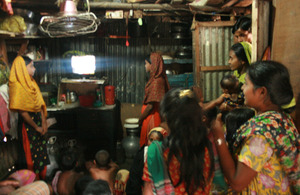DFID Research: Women and the media in Bangladesh
Research carried out by the Pathways of Women’s Empowerment programme in Dhaka has explored how media is affecting the lives of women in Bangladesh

Women watching TV
Women have increasingly taken on new roles over the past two decades within Bangladeshi society, occupying positions where women would not have been previously seen. For instance, far more women are attending university or becoming wage-earners than before. This shift is thought to have been influenced by urban culture and popular media. The Pathways of Women’s Empowerment South Asia research team, based at the BRAC Development Institute in Dhaka has sought to explore how media is affecting Bangladeshi women’s lives by shaping their aspirations.
In exploring media engagement within the research it was possible to show how women are able to imagine themselves in different roles, while also providing hope and belief that a different reality was possible. This goes against a common criticism of the media, which typically places it as a medium that objectifies women and reinforces stereotypes.
The research also showed that women continued to engage with the narratives on screen when they switched the television off. They adapted their fashions, incorporated the dialogue and the programmes made a lasting impression on them. For example, married respondents said they like serials depicting the tension, and emotional war in families, and even showing physical violence within families.
To explore the reasons for watching these narratives and images a respondent in Bhasantek said: “Seeing women protest is a matter of learning. It shows that women can stand up against injustice. These should be shown much more on television. Then we can learn that women will not tolerate injustice silently…………even we can learn how married women can handle the hostile situation in the family.”
This research was able to show that TV can provide women with new spaces in which to view the world, expanding their knowledge and helping them escape reality; and that the contributions this can make to their wellbeing and empowerment have been underestimated by development. As such, it is important to remove these stereotypes and replace dominant narratives with a diversity of representations. Time and further research might show whether the engagement with television will lead to new ways of being or if it will simply reconfigure the existing parameters of women’s lives.